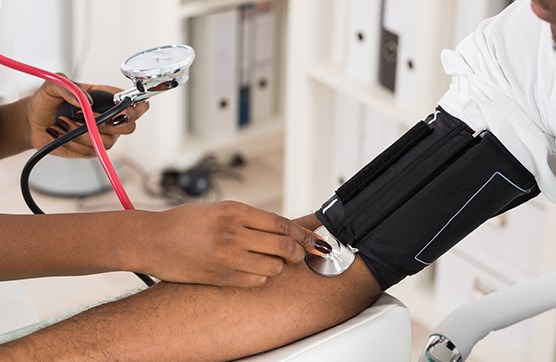Hypertension education is key for driving lifestyle behaviour change
Hypertension, also known as high blood pressure, is a very common but often undiagnosed condition. If left undetected, your blood vessels and heart may undergo substantial damage, resulting in congestive heart failure, stroke, kidney disease and vision loss. Get tested and know your blood pressure, cholesterol and blood glucose numbers in order to prevent and control rising blood pressure.

‘While there may not be any symptoms, that does not mean there is no cause for concern,’ says Dr Vinod Thomas, Cardiologist and Cardiac Electrophysiologist at Life Vincent Pallotti Hospital in Cape Town. ‘And if you are not consistent in ensuring that your blood pressure is under control, you put yourself at increased risk of life-threatening conditions.’
Blood pressure is determined by the amount of blood your heart pumps and the amount of resistance to blood flow in your arteries. The more blood your heart pumps and the narrower your arteries, the higher your blood pressure.
With 6.3 million people living with high blood pressure, South Africa has one of the highest rates of hypertension worldwide. Statistics show that about 130 heart attacks and 240 strokes occur daily in South Africa. This means that 10 people will suffer a stroke and five people will have a heart attack every hour.
Fortunately, high blood pressure can be easily detected. And once you know you have high blood pressure, you can work with your doctor to control it.
‘Ask your doctor for a blood pressure reading at least every two years, starting at age 18. If you are younger with a high risk of high blood pressure, or older than 40, measure it at least once yearly,’ says Dr Thomas.
Depending on your results, your doctor may prescribe medication to help control your blood pressure. It’s important to note that you will have to keep taking this medication.
‘Many patients stop taking their treatment when their blood pressure improves, but it only gets better because of this medication – you have to stay on your treatment regimen,’ he says.
Along with medication, there are lifestyle changes that can lower blood pressure and decrease the risk of health complications.
How to prevent Hypertension
Preventative measures to ensure rising blood pressure is controlled or prevented include:
- Eating a well-balanced, low-salt diet
- Limiting alcohol and quitting smoking
- Enjoying regular physical activity
- Maintaining a healthy weight
- Visiting a healthcare provider to reassess your blood pressure status every year
Know your numbers:
- If your blood pressure is below 120/80 (meaning less than 120 mmHg of systolic blood pressure and less than 80 mmHg of diastolic blood pressure) then you have a normal, healthy blood pressure.
- If your blood pressure is less than 140/90 but above 120/80, you are at risk of becoming hypertensive.
- If your blood pressure is above 140/90, you need to see a healthcare provider to check whether you have hypertension and need treatments to help avoid heart disease and stroke.
Life Healthcare hospitals offer quality services for people who suffer from high blood pressure and heart conditions. Fortunately, with hypertension, once you know your numbers, your healthcare provider can help you control it.
About Dr Vinod Thomas
Dr Vinod Thomas began his career in an interesting way – with a BSc (Anatomy) in Archaeology under the tutelage of Prof Phillip Tobias at Wits University. He went on to study medicine and to specialise in cardiology in the UK and Canada before returning to South Africa. Dr Vinod is a cardiologist and cardiac electrophysiologist at Life Vincent Pallotti Hospital.

